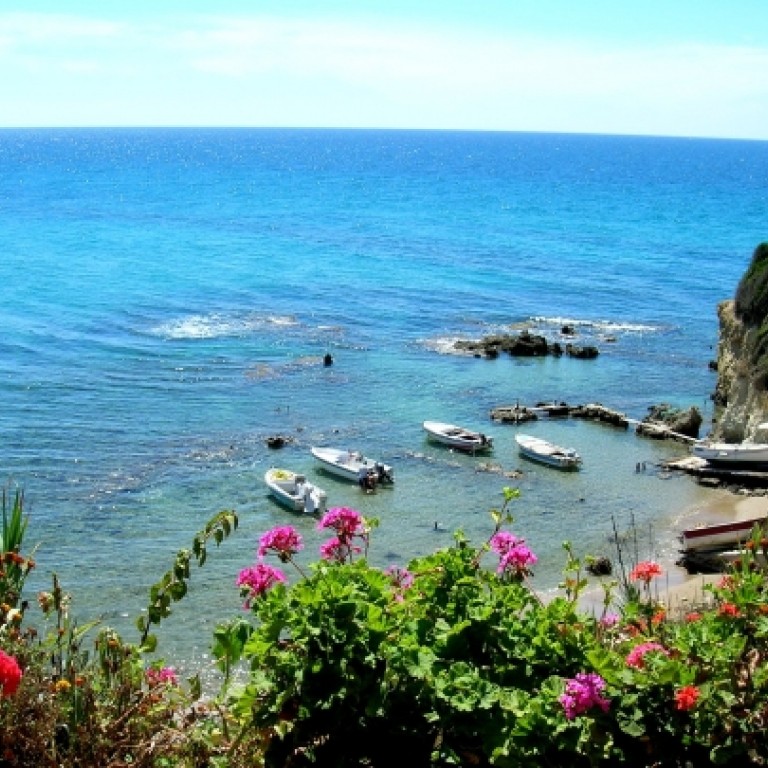
Corfu 2013 – Refugee of Russians and bingeing Brits
Seen through the prism of Asia, and particularly Hong Kong, it’s hard to grasp the reality of financial calamity in countries like Greece. So here’s the view from the Greek holiday island of Corfu. Greece’s misfortunes make it the G in the Pigs, the Eurozone economic basket cases which include Portugal, Ireland, Italy, Greece and Spain. Things are grim.
Avoiding disaster on Corfu’s perilous roads has always been a challenge, but now it’s doubly hazardous, due to the crater-like potholes and overgrown hedges – nothing gets fixed because of the economy, you are told. Rubbish overflows bins, which get emptied less often than before. Construction has ceased – only four new houses were started this year on the whole island, we learn.
The few tourists in evidence still speed round on scooters and quad bikes, minus helmets, and end up in hospitals and clinics. Where buyer beware: you can be handed a bill totaling several hundred euros, as friends did when their daughter cracked her collar-bone, needing only a simple sling. When her parents protested loudly, the bill was hastily reduced.
It’s hard to tell whether this is a recession driven try-on, or gouging based on the fallacy that all tourists have holiday insurance. Either way, there’s a tendency to charge like wounded bulls, unless someone says “no.” But Corfu still has tourists, yes? Up to a point. It’s changed. Cruise ships call in at Kerkira town still – you can see them on the horizon. But beachside resort towns and taverns that should be heaving in July are deserted, and in many cases, closed. First choice now is the all- inclusive resorts, where meals and drinks are included, discouraging tourists from straying outside to pricey bars and taverns.
Because most of Europe is broke too. The village operators may have only themselves to blame – had the food and drink prices not been inflated in previous years, the all-inclusives might have struggled. But many local places still charge like wounded bulls – three or more euros for a beer or glass of local wine and 20 euros for a main-course moussaka. It may sound cheap compared to Lan Kwai Fong, but this is Corfu, not San Tropez. Some tavern owners get it and have dropped prices – dinner with drinks for 10 cost 135 euros last night – but one round of drinks at another beachside place today came to 45 euros, with four small plates of potato chips. The all –inclusive places may offer limited choice, but they score on value.
The Russians Invasion
The Euro recession holidaymaker is a different breed. Gone are the affluent Germans and French. Instead it’s Russians, in bulk. The Marbella hotel next door is a case in point. Previously full of French and German families, now it’s all-inclusive and Russian is the lingua franca.
Party till you’re hospitalised
So where have the Corfu-loving Brits gone? They’re a different bunch too. At the southern tip of the island is Kavos, described as “the nearest place to Hell without getting burned” in a Channel 4 documentary. The Kavos strip makes a Bangkok stag weekend look like a Vicar’s tea party. This is where 100,000 young Brits flee the UK gloom every summer for a cheap fortnight package of booze, sun and sex.
Most brag proudly about their exploits, happily sleeping and frying on the beach by day and partying on shots and psychedelic cocktails by night. In between the 60 dance bars serving up English breakfasts and football by day, and unlimited drink all night, are clinics patching up the casualties. Every day the Kavos ambulance speeds along the island’s main road ferrying the stretcher cases to hospital. The resident Kavos tattoo artist, a Brit, says it would be illegal to tattoo people this drunk in England. This hedonistic holiday end of the business is certainly booming, but brings little local employment, because only migrant British workers can stomach Kavos. Post-recession, Corfu could have some reputation re-building to do.

